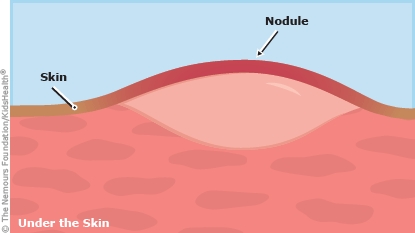Erythema Nodosum: How to Care for Your Child
Erythema nodosum is a painful, bumpy red or purple skin rash, usually on the shins. It can follow an infection or be due to other conditions, but many times the cause is unknown.


Erythema nodosum usually occurs on the shins but can show up elsewhere on the body. The rash is believed to be an overreaction of the body's immune system to something, like an infection, medication, illness, or hormones. In many cases, the cause is not known.
Some kids with erythema nodosum feel generally ill and may have a fever, achy joints or muscles, and/or swelling of the affected area.
Erythema nodosum begins as hot, red, painful nodules (lumps) that may turn purple and then fade to brown spots. They can look like bruises. The rash usually goes away within 2–8 weeks. The affected skin may look darker for a few months, but won't be scarred.
In most cases, erythema nodosum goes away on its own with time. Before then, treatment can help with symptoms. If the cause is known, the health care provider will also treat that underlying condition.

-
If the health care provider recommends a nonsteroidal anti-inflammatory drug (NSAID) or other medication to help with pain and swelling, give as directed.
-
To reduce swelling, elevate the affected area.
-
To help relieve discomfort, apply a cool, damp washcloth to the area.
-
Make sure your child rests and limits activity until feeling better. This may help avoid a return of the rash.
-
Follow the health care provider's instructions for treating any underlying infections or conditions.


Your child:
-
Develops new symptoms.
-
Has a rash that is not improving after several weeks.
-
Has a rash that improves and then returns.
-
Has trouble walking due to pain.